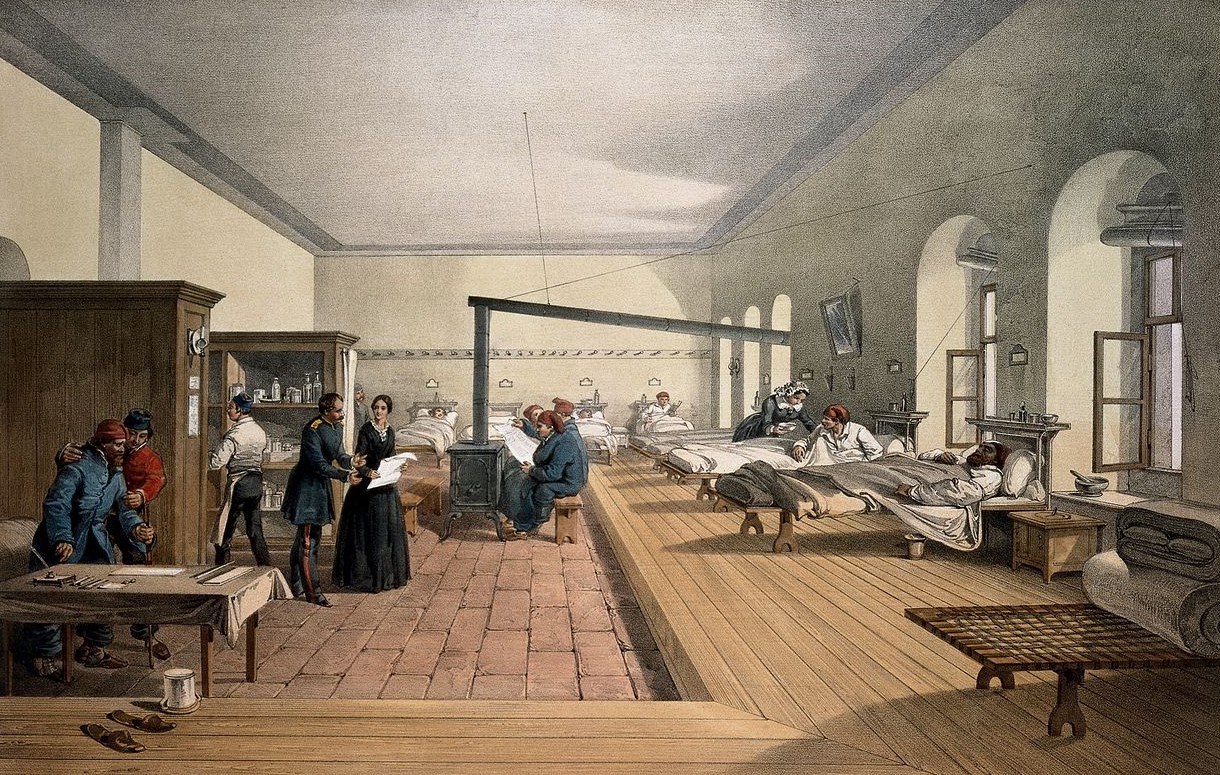Surprise! We Need Medicare for All
It’s good to see both Democrats and Republicans taking surprise medical bills seriously. But they’re missing the solution under their nose: Medicare for All.

A ward of the hospital at Scutari by William Simpson, 1856. Wellcome Images / Wikimedia
Aetna’s website has a list of precautions you can take to avoid getting surprise medical bills. It reads:
- Research your preventive care coverage and billing codes before your visit.
- Ask your doctor to use in-network labs for bloodwork, MRIs and other tests.
- Shop around for the best price on medical tests and procedures.
- Beware of “facility fees.”
- Prep for emergencies by finding out about ambulance providers in your area.
- Know your rights around “balance billing.”
This is absurd. We shouldn’t have to do any of this. Here’s a better to-do list:
- Dismantle private insurance companies like Aetna.
- Implement Medicare for All instead.
Fifty-seven percent of Americans say they’ve received a medical bill they weren’t expecting. Sometimes their crime was being unconscious in an ambulance taking them to the nearest (out-of-network) hospital. Other times their mistake was failing to stop their (in-network) provider from commissioning an $18,000 urine test from an (out-of-network) lab. Surprise medical bills like these are a major contributing factor to medical debt, which is the leading cause of bankruptcy in the US.
Pretty much everyone agrees that this situation is intolerable. Democrats, Republicans, and even Donald Trump are promising to do something to stop surprise medical billing. Legislation aimed at fixing the problem is now headed for both the House and the Senate.
It’s good to see lawmakers taking this problem seriously. But the legislation’s complexity is unnecessary. Reading about these bills is like watching a sideshow contortionist act. According to NPR, the Senate bill, already introduced by Bill Cassidy (R-LA) and Maggie Hassan (D-NH), would:
set out specific protections for patients who are at risk of surprise bills in the following scenarios: receiving emergency care from an out-of-network facility or provider; getting elective care from an out-of-network doctor at a facility that is in the patient’s insurance network; or receiving additional, post-emergency health care at an out-of-network facility because the patient cannot travel without medical transport.
Meanwhile the House bill, which will soon be introduced by Frank Pallone (D-NJ) and Greg Walden (R-OR), would:
require health care facilities to provide 24-hour notice to patients seeking elective treatment that they are about to see an out-of-network provider. It would prohibit the facility or provider from billing patients for whatever amount their insurance companies did not cover for that service. And it would set provider payment rates based on the market in that specific area.
If all of that went over your head, don’t sweat it. It’s really complicated. And it shouldn’t be: we can make the whole thing much simpler and better by implementing a single-payer health insurance program. Instead of establishing elaborate guidelines for how insurers and providers should interact with each other in specific situations, lawmakers should just give private insurers the boot.
Medicare for All would create a single universal network that covers everyone and everything. That network would be democratically controlled and transparent, instead of corporately controlled and unaccountable. It would be paid for by taxes, which would cost less for most individuals, and save trillions of dollars overall.
The only real losers would be the private insurance companies, which would be consigned to the dustbin of history. Obviously they don’t want that, so they lobby vigorously to obstruct any movement toward Medicare for All. The result is that lawmakers are kept busy drafting proposals to curtail the worst predatory practices of private insurers, but most stop short of envisioning a world without them.
The current surprise medical billing proposals might provide some relief, but they can’t solve all of our health care finance problems. Surprise billing is outrageous, but totally predictable billing can be just as financially devastating.
Plenty of people opt to get treatment not covered by their insurer, with full awareness of that fact, simply because they need it and have no other choice. And that’s not to mention the co-pays, premiums, and deductibles that eat into hundreds of millions of Americans’ paychecks every month — or the widespread lack of insurance altogether.
A single federal tax-funded health insurance program would end not just surprise billing but all individual billing. No person would ever have to worry about whether they can personally afford the health care they need. Gone would be the imploring GoFundMe’s, the medical debt-induced bankruptcies, and the endemic fear of ambulances.
We can end the private insurers’ reign of terror, but it will take more than Rube Goldberg-like policy tinkering. A truly sane and fair health care system requires bold and decisive action. It requires Medicare for All.